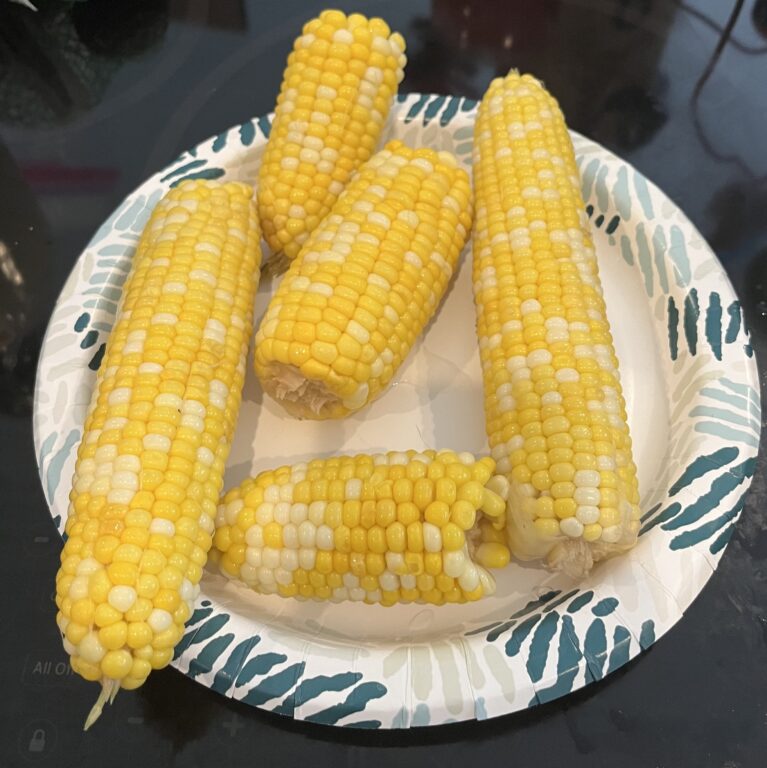Consumer Diary: Beach Bacteria and Corn

Audio By Carbonatix

We enjoyed this herd of elephants charity display at Salve Regina University on the Cliff Walk above Easton’s Beach in Newport, RI, where two days before I suffered a bacteria attack from walking in the ocean. Courtesy of Harlan Levy
Consumer columnist and West Hartford resident Harlan Levy has more than 20 years of experience writing stories about everyday experiences that anyone could encounter.
By Harlan Levy
It happened again.
Two years after an excellent vacation in Newport, Rhode Island, we returned last week to the same affordable hotel for six long-awaited days of summer vacation. “We” is my daughter, her husband, their 3-year-old daughter, their 4-week-old son, their dog, our son, his wife, their two daughters (5 and 2), and my wife, and I … a lot. And a lot of chaos.
Like two years ago, we went one hot day to Easton’s beautiful beach, and, unlike then, I didn’t swim in the ocean. Two years ago, after a brief dip, I ended up with an itchy rash all over my legs, the product of an explosion of bacteria in the warming ocean waters.

Easton’s Beach in Newport RI last week where I suffered a bacteria attack from walking along the ocean water’s edge — not even swimming! Photo credit: Harlan Levy
This time I only went to the edge of the water – to fill a bucket for our three little sand sculptors.
Later, my son-in-law recalled that he saw some water spilling out over my legs when I walked back to the sculpture site. That was the clue to why the rash – the large red itchy blotches – appeared on my legs. Again. And they still have not subsided now five days later.
Warning to New England beachgoers: Climate-change-caused warmer waters and more heavy rains have created “ideal” conditions for e-coli and other people-loving bacteria to thrive – on you. The bacteria can cause blisters, rashes, diarrhea, muscle weakness, and liver damage.

Is corn a starch or a vegetable? I found the surprise answer, adding to the great pleasure of summer corn. Photo credit: Harlan Levy
Who doesn’t love fresh corn? But what is it?
On our way back from Newport we stopped at a roadside farm stand and picked out several ears of corn – which you see in my photo – for a Sunday night feast, which included roasted potatoes. Was that too much starch? Is corn actually a starch or something healthier, I wondered?
Dr. Melissa Brown, Nutrition Department Chair at the University of Saint Joseph, had some surprising answers:
- Starch or something else? “Corn can actually be considered a vegetable, a grain, or even a fruit,” she said.
- Promote digestion? “Corn has a good amount of fiber and, more specifically, insoluble fiber, the type of fiber that promotes healthy digestion and bowel regularity. If someone suffers from diarrhea traced back to a lack of fiber, corn may help. Corn has what’s called resistant starch, a prebiotic and provides nutrients to gut bacteria, ultimately reducing any inflammation in the gut.”
- Does it help fight colon cancer, diabetes, and heart disease? “Yes. It could help, based on having fiber and other essential nutrients as well as the antioxidants zeaxanthin and lutein. Also, corn is a low-fat food containing potassium, both important factors in heart health. Low fat foods help manage blood lipid levels, and potassium helps manage blood pressure.”
- What about vitamins? “Corn has many essential nutrients, including Vitamins A and C.”
- Is it a good source of energy? “Yes.”
- Compare fresh, frozen, and canned corn. “Advances in food technology have resulted in very little difference in nutrient profiles when comparing fresh to frozen and canned corn, if the corn is frozen or canned right after picking and contains just the corn kernels. But if you’re watching your sodium intake and purchase canned corn, select one with no sodium or low sodium. Or rinse the corn in a strainer for 30 to 60 seconds to wash off extra sodium.”
- Compare corn to ultra processed foods. “The corn kernel is considered a whole grain, a healthier option compared to an ultra processed product that would be stripped of its whole grain as well as important nutrients. Corn may decrease inflammation, while the iulgtra processed food with a lot of added sugar would likely promote inflammation.”
Now you and I know.
NOTE: If you have a consumer problem, contact me at [email protected] (“Consumer” in subject line), and, with the power of the press, maybe I can help.
Like what you see here? Click here to subscribe to We-Ha’s newsletter so you’ll always be in the know about what’s happening in West Hartford! Click the blue button below to become a supporter of We-Ha.com and our efforts to continue producing quality journalism.



